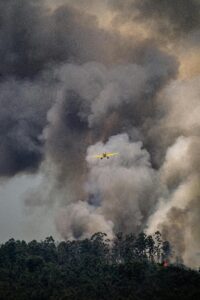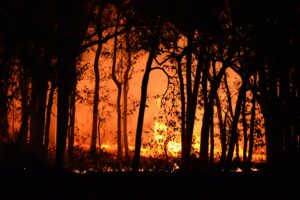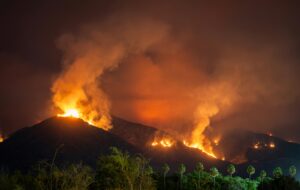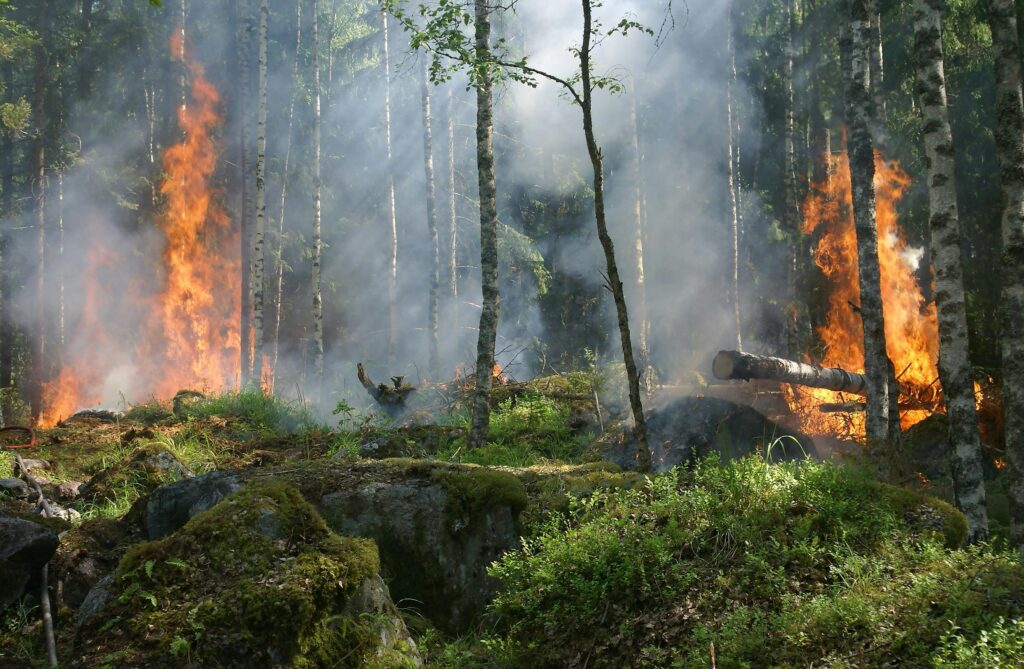In recent years, forest fires have become a stark symbol of the devastating impact of climate change. Across continents, wildfires are growing in intensity, frequency, and scale, threatening ecosystems, human lives, and the global climate. The link between climate change and forest fires is undeniable, as warming temperatures, prolonged droughts, and erratic weather patterns set the stage for more frequent and severe blazes.
The Science Behind the Flames
Climate change acts as an accelerant for wildfires by creating conditions that allow fires to ignite and spread more easily. Rising global temperatures lead to drier vegetation, making forests more flammable. According to the Intergovernmental Panel on Climate Change (IPCC), for every degree Celsius of warming, the atmosphere can hold 7% more water vapor, which can lead to prolonged dry spells and droughts in many regions. Additionally, erratic weather patterns, such as stronger winds and unpredictable rainfalls, further exacerbate the risk of wildfires.

Recent Incidents Highlighting the Crisis
The year 2023 witnessed several catastrophic wildfires across the globe. In Canada, an unprecedented wildfire season burned over 17 million hectares of land, making it the worst in the country’s recorded history. The smoke from these fires created hazardous air quality levels, affecting millions across North America. Meanwhile, in the Mediterranean region, Greece, Italy, and Turkey faced severe wildfires fueled by heatwaves, with temperatures soaring above 45°C. In Greece, more than 20,000 people were evacuated from the island of Rhodes, marking one of the largest wildfire evacuations in Europe.
The Hawaiian island of Maui also experienced a devastating wildfire in August 2023, which claimed over 100 lives and razed the historic town of Lahaina. Experts linked the intensity of the fire to prolonged drought conditions and strong trade winds exacerbated by a nearby hurricane. In October 2023, Los Angeles faced a significant wildfire that scorched thousands of acres, forcing the evacuation of over 5,000 residents. The fire, fueled by strong Santa Ana winds and unusually dry conditions, highlighted the growing vulnerability of urban areas to wildfires. Authorities pointed to record-low rainfall levels and unseasonably high temperatures as major contributors to the disaster.

Environmental and Economic Impacts
Forest fires have far-reaching consequences that extend beyond the immediate destruction. Ecologically, they devastate habitats, threaten biodiversity, and disrupt carbon storage. Forests, often referred to as the “lungs of the Earth,” play a critical role in absorbing carbon dioxide. When they burn, not only is this capacity lost, but stored carbon is also released into the atmosphere, further accelerating global warming. Economically, the costs of wildfires are staggering. The Canadian wildfires in 2023 alone resulted in billions of dollars in damages, with losses from destroyed properties, disrupted industries, and firefighting efforts. Additionally, the health impacts of wildfire smoke, which contains harmful particles and toxins, impose significant costs on healthcare systems.
Addressing the Issue
Mitigating the impact of forest fires requires a multi-faceted approach. Reducing greenhouse gas emissions is paramount to curbing the underlying driver of climate change. Governments must also invest in better forest management practices, such as controlled burns and clearing flammable underbrush, to reduce fire risk. Early detection systems and improved firefighting technologies are crucial in minimizing the damage caused by wildfires. For example, satellite monitoring and AI-driven models can help predict fire risks and enhance response times. Additionally, international cooperation is essential to address this global challenge, as the effects of wildfires often transcend national borders.

Conclusion
The increasing frequency and intensity of forest fires serve as a sobering reminder of the urgent need to combat climate change. As the planet warms, the threat of wildfires will continue to grow, endangering ecosystems, economies, and human lives. By taking collective action to address climate change and improve forest management, we can hope to mitigate the devastating impact of these blazes and protect our planet for future generations.



